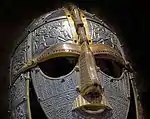Staller (title)
Staller is an Anglo-Saxon title that was held by various high-ranking officials of the crown during the 11th century. It ceased to be used in the 1070s.
| This article is part of the series: |
| Anglo-Saxon society and culture |
|---|
 |
| People |
| Language |
| Material culture |
| Power and organization |
| Religion |
Its origin, and exact meaning, are disputed. One suggestion is it derives from the Latin comes stabuli, or Count of the Stable, a title used in the Byzantine Empire, and later adopted by the Franks.[1] Another likely possibility is that it refers to a seat, or steall in the king's hall, one of the privileges granted to a thane, or royal retainer. However, these are both unproven.[2]
It seems likely it was a different term for an existing position; the first confirmed occurrence in England was by Edward the Confessor, who used it for senior members of his personal household.[3] Their duties appear to have been flexible; on a charter witnessed by stallers Ansgar, Bondi, Robert FitzWimarc, and Ralph in 1065, they are described as Royal stewards.[4]
Anglo-Saxon office-holders
- Ansgar the Staller (fl 1044-1066)
- Bondi the staller (fl 1065)
- Eadnoth the Constable (died 1068), also known as Eadnoth the Staller
- Osgod Clapa, London [4]
- Ralph the Staller (1011–1068)
- Robert FitzWimarc (died before 1075), also known as Robert the Staller
- Tovi Pruda (fl. 1018–1043)
References
- Barnwell 2006, p. 23.
- Williams 2008, p. FN78.
- Hull Domesday Project.
- Williams 2008, p. FN80.
Sources
- Barnwell, PS (2006). Emperor, Prefects & Kings: The Roman West, 395-565. The University of North Carolina Press. ISBN 978-0807820711.
- "Constable, or Staller". Hull Domesday Project. Retrieved 18 April 2020.
- Williams, Ann (2008). The World Before Domesday: The English Aristocracy 900-1066. Continuum. ISBN 978-1847252395.